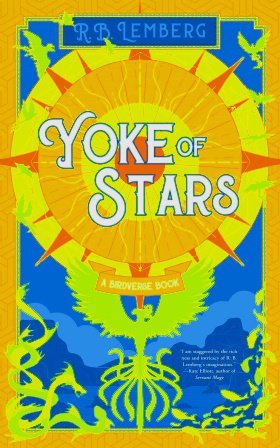The woman spoke slowly, making sure Ulín understood her words. And Ulín was hungry for words, so she wrote them down in her notebook, to study later. But now she raised her head from the page and gave words to this dreamway woman, who was some twelve years her senior. Ulín was just newly nineteen.
“Is it true that in your land, your women inherit? He told me so,” the woman said.
“This is not how we live,” Ulín said. “I could inherit if I wanted to, and if my people approved of me. But I have no desire to govern, so it will not even come to a vote.”
“But your brother,” the dreamway woman said. “He is a man.”
Ulín shrugged. “He might or might not be. He is a child. Thirteen. At his first gathering, my sibling might adopt the language of she or he, or declare themself ichidi and adopt the language of they. It is too early to know.”
Ulín did not mean to say anything inappropriate or weird. She learned only later that among the serpent people, statements like these were admissions of shame. Admissions of deviance. Invitations to hate.
7
I say, “You were simply sharing your language. You thought your sibling could have been an ichidi . . .” The word is a familiar weight in my mouth, a yearning for someone who taught me the word, someone who is no longer here.
Ulín smiles at me. “You pronounced it perfectly.”
I look away from her, stilling my features. “In the tongues of the desert, such people are called in-betweeners. In the siltway tongue, there are no words like that. Nor words for woman or man. Nobody is different from another person.”
“Perhaps you are all in-betweeners,” Ulín speaks as if it’s a jest. But it’s not.
“No,” I say. “It’s not that. It’s that a single person is unimportant. We are a collective. The language of I itself is discouraged, even though many use it.”
“I would love to hear more,” she tells me, warm.
“I will tell you more. But not yet. First, I want more of your story.”
Laufkariar came in the night. He had hunted in serpentshape in the dreaming sea that stretches above the waking lands. Only the strongest of dreamway hunters could ascend there, and for him it was easy, to leap up in serpentshape, leaving nothing behind. Ulín had always admired him for it. His power. His prowess. Now his breath smelled of lilac, and in his violet eyes were reflected his kills—dreaming fish and porpoises; aquatic birds; even serpents. Ulín did not think it violent—these were only dreams, after all. He hovered above her, his smile of hunger and need, and he was the handsomest of men, and she wanted—
She wanted to show him her notebook.
“Look, I am learning your language,” she said. “I’m making such interesting discoveries. For example—”
Laufkariar looked frustrated at first, uninterested. Then he grabbed the pages.
“Who said all this?”
“Oh, your sister, I think.” Ulín described her to him. “She’s helping me learn.”
“You are naïve, nameway woman,” he said. Then: “Beloved.”
His gaze was dark, but he bent to kiss her, and Ulín’s breath caught. Her whole body yearned for him, just like her mind yearned for words and their meaning.
“She is simply jealous,” he said. “Jealous that she can never inherit. Jealous and weak. She’s not even a hunter. Don’t worry.”
Ulín was falling asleep when he stepped out of the room.
Ulín breathes deep. Looks away. “Can you teach me a word? Any word?”
She needs a break, I guess. And I don’t mind.
“All right.” What shall I teach her, then? “Rordan is a word that means inwards-toward-the-center-of-dan. Roh-ereh-dan. Dan is the thing which is stable.”
“Stable like a stone?” Ulín leafs through the notebook. “Like kah and kahir?”
“No, not like a stone. Dan means the solidity and center of people. Rordan is the centered, stable thing which is all of us. A collective. Perhaps you would say in your language, a family.”
“I’d say . . . a house,” she offers.
I do not understand. “A dwelling?”
She nods. “A dwelling which is a center of people. For me, it’s the house of my ancestor Ranra. Once, in our Coastal language, the word house meant ship.”

























